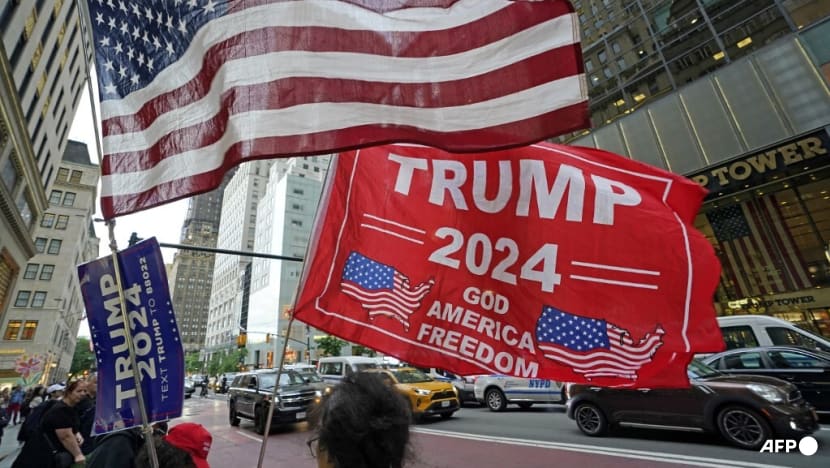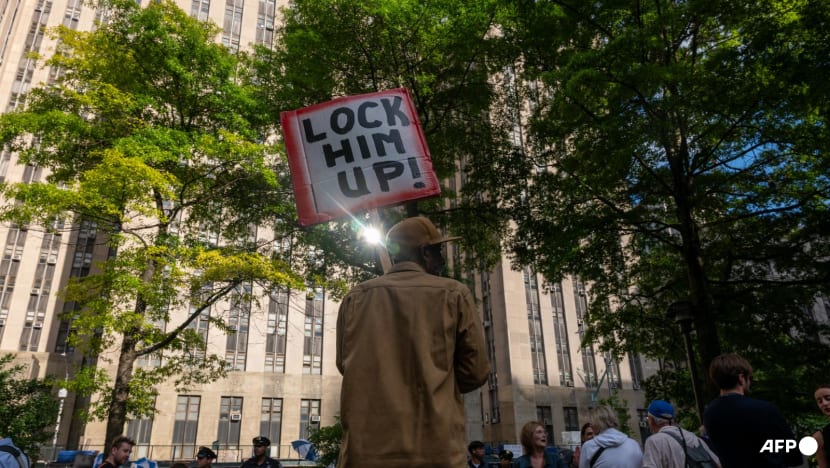What's next for Donald Trump after hush money trial conviction?
Donald Trump has been found guilty on all 34 counts of a hush money trial.

Supporters of former US President and Republican presidential candidate Donald Trump gather outside Trump Tower after he was convicted in his criminal trialin New York City, on May 30, 2024. (Photo: AFP/Timothy A Clary)
Donald Trump, the first former US president to be convicted of a crime, will remain a free man while he awaits sentencing and could avoid a prison term entirely for falsifying business records to cover up a hush money payment to a porn star.
Here is a look at what’s next for the Republican candidate for president against Democratic President Joe Biden in a Nov 5 election.
WHAT HAPPENS NOW?
The judge presiding over the case, Juan Merchan, must first approve the verdict and enter a final judgment, although this is typically a formality.
Criminal defendants in New York are typically sentenced within several weeks of conviction, but post-verdict legal wrangling can sometimes lead to months of delays.
In the meantime, lawyers and prosecutors will recommend sentences and then argue over them at Trump’s sentencing hearing, where Merchan will make a decision.
WILL TRUMP GO TO PRISON?
That is unlikely. The maximum sentence for Trump’s crime of falsifying business records is four years in prison.
Six legal experts, including defence lawyers and former prosecutors, told Reuters it was rare for people without criminal histories – like Trump – who are charged solely with falsification of business records to be sentenced to prison time in New York.
Punishments like fines or probation are more common.
But one expert said precedent can only be so helpful in guiding Merchan's decision on the appropriate sentence in the first criminal trial of a US president past or present.
"Typically this is not the kind of case where you would expect a first-time white-collar offender to receive a sentence of incarceration," said New York defence lawyer Andrew Weinstein, who in 2009 represented a man sentenced to three years' conditional discharge after pleading guilty to falsifying business records as part of a check-cashing scheme.
"But everything about Trump is different, so I don't think you can look historically at other sentences because he's just a different animal."

Defendants convicted of falsifying business records who get sentenced to time behind bars typically serve a year or less, and even in those cases most were convicted of other crimes such as fraud or grand larceny.
If punished beyond a fine, Trump could be placed under home confinement or subject to a curfew rather than imprisoned.
As a former president, he has a lifetime Secret Service detail, and the logistics of keeping him safe behind bars could be complicated.
Trump could also be released on bail while appealing his conviction.
Listen:
CAN TRUMP APPEAL THE CONVICTION?
Yes. Trump is likely to make arguments that Merchan rejected ahead of trial, including that the indictment is legally flawed and politically motivated.
He is also likely to argue Merchan deprived him of a fair trial by making legal errors, including allowing salacious testimony by a porn star who said she had sex with Trump – testimony his lawyers said was gratuitous and aimed at inflaming the jury against him.
The defence is likely to argue that the charges themselves were legally improper.
Falsifying business records on its own is a misdemeanor in New York, but is elevated to a felony when done to help commit or conceal another crime. In this case, Bragg's office said that the other crime was a conspiracy to violate a state election law.
But Trump's lawyers have argued that state law does not apply to federal elections.
COULD TRUMP STILL BE PRESIDENT?
Yes. The US Constitution only requires that presidents be at least 35 years old and natural-born US citizens who have lived in the country for 14 years.
In theory, Trump could be sworn in from jail or prison on Inauguration Day, Jan 20, 2025, if he were to unseat Biden.
















